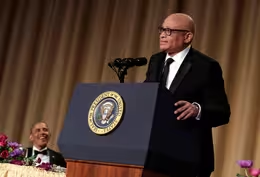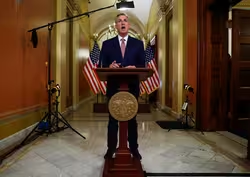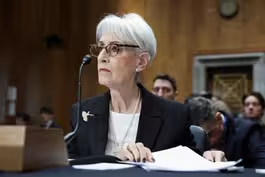
Republican Rep. Tom Cole discusses debt ceiling debate
Clip: 2/23/2023 | 7m 44sVideo has Closed Captions
Republican Rep. Tom Cole discusses debt ceiling and issues facing a divided Congress
Every second, the U.S. falls about $43,000 deeper into debt. Lawmakers will need to raise the country’s borrowing limit in the coming months to avoid a catastrophic financial fallout at home and around the world. Republican Rep. Tom Cole is vice chairman of the House Appropriations Committee and chair of the House Rules Committee. He joined Geoff Bennett to discuss the debate.
Problems playing video? | Closed Captioning Feedback
Problems playing video? | Closed Captioning Feedback
Major corporate funding for the PBS News Hour is provided by BDO, BNSF, Consumer Cellular, American Cruise Lines, and Raymond James. Funding for the PBS NewsHour Weekend is provided by...

Republican Rep. Tom Cole discusses debt ceiling debate
Clip: 2/23/2023 | 7m 44sVideo has Closed Captions
Every second, the U.S. falls about $43,000 deeper into debt. Lawmakers will need to raise the country’s borrowing limit in the coming months to avoid a catastrophic financial fallout at home and around the world. Republican Rep. Tom Cole is vice chairman of the House Appropriations Committee and chair of the House Rules Committee. He joined Geoff Bennett to discuss the debate.
Problems playing video? | Closed Captioning Feedback
How to Watch PBS News Hour
PBS News Hour is available to stream on pbs.org and the free PBS App, available on iPhone, Apple TV, Android TV, Android smartphones, Amazon Fire TV, Amazon Fire Tablet, Roku, Samsung Smart TV, and Vizio.
Providing Support for PBS.org
Learn Moreabout PBS online sponsorshipGEOFF BENNETT: Every second, the U.S. falls about $43,000 deeper into debt.
Lawmakers will need to raise the country's borrowing limit in the coming months to avoid a catastrophic financial fallout both here at home and around the world.
Many Republicans say it's time to take a hard look at federal government spending.
Republican Congressman Tom Cole is vice chairman of the House Appropriations Committee and chair of the House Rules Committee.
And he joins us now from Norman, Oklahoma.
Thanks for being with us.
REP. TOM COLE (R-OK): Hey.
Great to be with you.
GEOFF BENNETT: And the U.S. faces a default as early as this summer if Congress fails to raise the debt ceiling.
What's the latest on the negotiations between House Republicans and the White House?
Has there been any movement on this?
REP. TOM COLE: Well, obviously, I think the president and Speaker McCarthy had a good first meeting.
I think each side are having quiet talks in terms of what's acceptable.
Both sides have said the default is not the appropriate measurement.
Both sides have ruled, at least for this immediate agreement, Social Security and Medicare off the table.
So, I think there's enough common basis.
And, look, normally when you're in a situation like this in divided government, you try to change the trajectory of the spending.
And that's what we'd like to do.
But, at the end of the day, we need to get to an agreement.
And I think we will.
GEOFF BENNETT: Let's talk about entitlements, because Social Security and Medicare, in particular, Social Security, as you know, without a change in policy, its reserves will run dry by 2034.
You have proposed establishing a commission to look at solutions.
What reforms, in your view, seem workable and seem practical?
REP. TOM COLE: Well, first of all, I think you have to agree on the process before you worry about the reforms.
And, actually, my proposal was bipartisan, when I originally put it out there.
This is something former Representative John Delaney and I worked on together.
And we said, hey, when's the last time we actually confronted this problem, and how do we solve it?
And we went back and looked at the '83 commission chaired by Alan Greenspan at the time during the Reagan presidency, but a framework agreed upon by President Reagan, Democratic Speaker Tip O'Neill, Republican Majority Leader in the Senate Howard Baker.
And they arrived at a solution.
And guess what?
Everybody had to give a little bit.
There were some reforms.
There was some additional revenue.
But, at the end of the day, they extended the life of the system by almost a half-a-century.
And it was at that point within two months of having an across-the-board cut similar to what we will face in 2033.
So we decided we should go back and do basically the same thing.
It's not that hard to figure out.
It's a math problem with Social Security.
And Congress, 60 days legislative, days to vote up or down, no amendments, just you either want to save Social Security, you're willing to make some trade-offs, or you're not.
So I think that's the way to go.
Now, in terms of specifics, personally, I have a lot of different suggestions.
I do think we're living longer.
Raising the age makes a little bit of sense to me.
I do think we ought to look seriously at what countries like Norway do.
And that is invest in the private sector, not all of it.
But I think the main idea is to save the system.
GEOFF BENNETT: How raising taxes?
Is that on the table?
REP. TOM COLE: Sure.
Revenue would have to be on the table.
The last time they did this, they increased the amount of your revenue that was subject to taxation.
That doesn't raise the tax, but increases the tax base, something I noticed Senator Warren suggested recently.
And you also -- we made a minor tweak in the amount of money both the individual and the employer put into it.
And, finally, the last time we did this, we also made part of Social Security, depending on your income level, taxable, update to 85 percent.
So, yes, I think revenue is part of it, simply because we're living a lot longer.
But reforms are part of it too.
And that's where I think the commission would be likely to come to a sort of trade-off between the two, something that both sides could find acceptable.
What's unacceptable is to do nothing, which is exactly what, honestly, the administration right now is proposing.
It's what the last administration proposed.
But -- so Republicans and Democrats have tried to avoid the problem by saying we're not going to touch it.
If you don't touch it, it's going to go insolvent, we will have a 22 percent across-the-board cut.
That's not something I'm interested in doing to people in their 70s, 80s and 90s.
GEOFF BENNETT: Looking at this latest NPR/"PBS NewsHour"/Marist poll on the debt ceiling and how to pay down the national debt, half of those polled, 50 percent, say they favored mostly cutting programs and services, but almost as many, 46 percent, said they prefer to see taxes and fees raised.
In looking at the federal debt, entitlements make up half of the debt.
The other part of it is defense spending.
And there are Republicans and Democrats who say they don't want to touch the Pentagon budget.
So what then is left?
What's left?
REP. TOM COLE: You said the -- well, you set the defense budget based on the threats in the world.
And I would suggest people ought to look at Ukraine, look at what China's doing, understand how dangerous the world is today.
Now, again, the real driver here is entitlements.
It's not defense.
Defense is -- the discretionary budget of the United States is 30 percent of all spending; 60 percent is Social Security, Medicare, Medicaid.
Throw in interest on the debt and the federal pension system, you're at 70 percent.
The remaining 30 percent, defense is 15 percent.
So, our problem is, people want to try and balance the budget on either 30 percent of the spending, including defense, or 15 percent.
That's not doable.
You have to look at entitlements.
And that's both a revenue and a reform issue, in my mind.
GEOFF BENNETT: And you're hoping to get recommendations from this panel within the next year?
REP. TOM COLE: If my legislation passed, that's what we did.
And, again, when people put brand-new things on the table and argue over the programs, it really slows you down.
And the first thing you need to do is agree on a process.
By the way, President Biden actually voted for this in 1983.
He voted for both the process and the final solution.
So I'm mystified now as to why he doesn't find this acceptable.
GEOFF BENNETT: And, lastly, the House speaker appears to have given FOX host Tucker Carlson exclusive access to some 40,000 hours of previously unreleased surveillance camera footage from January 6.
Was that something that he discussed with you and other House Republican leaders in advance?
And what do you make of that decision?
REP. TOM COLE: I have not heard about this until I read about it in the last day or so in the media.
Look, I'm for people having access to most of this information.
If there's something sensitive, probably, we should sit down in a bipartisan way and say, OK, this affects the safety of the House.
But, at the end of the day, you're -- you're just better off sharing information, letting people draw their own conclusions.
That was the view of the founders on the First Amendment.
I think it's worked out pretty well for 240-odd years.
Let's just stick with that.
GEOFF BENNETT: So, then should other news outlets have access to the same material, beyond Tucker Carlson, a known conspiracy theorist and liar?
REP. TOM COLE: In my personal opinion, yes - - in my personal opinion, yes, they should.
But, again, I don't get to make that decision.
I will note the Democrats obviously made selective parts of this available to people that they wanted to, I just think you're better off avoiding that.
Put it out there, let anybody who wants to have a look do so and make whatever case they want to make.
The American people are pretty smart.
They will figure it out.
GEOFF BENNETT: Congressman Tom Cole, always enjoy speaking with you, sir.
Appreciate you.
REP. TOM COLE: Hey, my pleasure.
Thanks for having me.
Abortion pills latest battleground over reproductive rights
Video has Closed Captions
Clip: 2/23/2023 | 7m 57s | Abortion pills become latest battleground over reproductive rights (7m 57s)
How Larry Wilmore's 30 years in TV have shaped comedy
Video has Closed Captions
Clip: 2/23/2023 | 7m 51s | How Larry Wilmore's 30 years in TV have shaped comedy and challenged traditional notions (7m 51s)
New poll shows where Americans stand on debt ceiling debate
Video has Closed Captions
Clip: 2/23/2023 | 4m 27s | New poll shows where Americans stand on debt ceiling debate, raising minimum wage (4m 27s)
NTSB releases preliminary report on Ohio derailment
Video has Closed Captions
Clip: 2/23/2023 | 3m 44s | NTSB releases preliminary report on Ohio derailment that led to toxic chemical spill (3m 44s)
Ukraine's fight against Russia forges new levels of unity
Video has Closed Captions
Clip: 2/23/2023 | 6m 8s | Ukraine's fight against Russia forges new levels of national unity a year into war (6m 8s)
U.S. Deputy Secretary of State on status of war in Ukraine
Video has Closed Captions
Clip: 2/23/2023 | 7m 18s | U.S. Deputy Secretary of State on where Russia's war on Ukraine stands one year later (7m 18s)
Providing Support for PBS.org
Learn Moreabout PBS online sponsorship
- News and Public Affairs

FRONTLINE is investigative journalism that questions, explains and changes our world.

- News and Public Affairs

Amanpour and Company features conversations with leaders and decision makers.
Urban Consulate Presents











Support for PBS provided by:
Major corporate funding for the PBS News Hour is provided by BDO, BNSF, Consumer Cellular, American Cruise Lines, and Raymond James. Funding for the PBS NewsHour Weekend is provided by...





